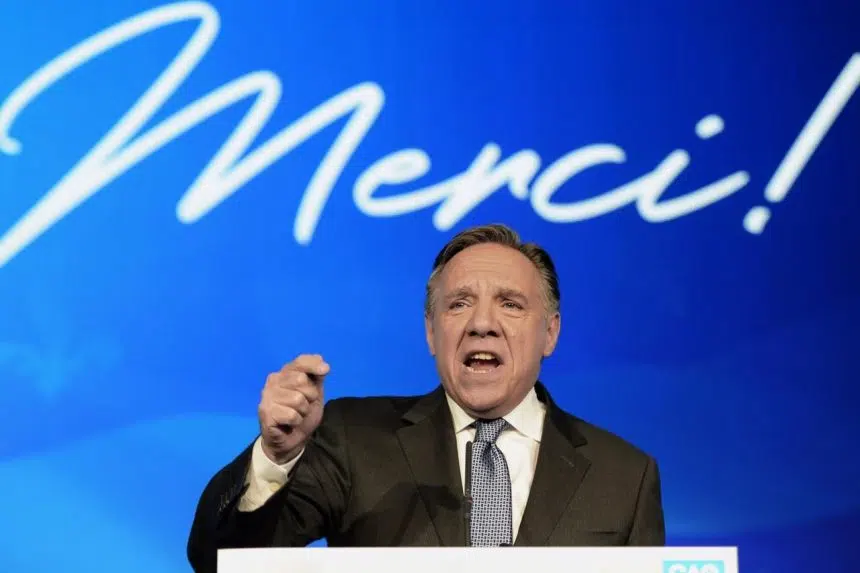QUEBEC — Addressing Quebec for the first time as premier-designate Monday night, Francois Legault touched on a theme he returned to repeatedly during the 39-day election campaign.
On the hustings he promised to make Quebec stronger and richer and to rekindle a sense of pride, and he had just been given a mandate to follow through.
“We will build a stronger Quebec — a prouder Quebec!” he shouted, his voice almost cracking.
Monday’s election was third time lucky for the Coalition leader as the party won 74 of the province’s 125 ridings.
Seven years after creating his party and following two election attempts that fell short, Legault will become the first premier since 1966 to win a general election leading a party other than the Liberals or Parti Quebecois.
Legault has positioned his party as a federalist, economically minded alternative to the Liberals, and a nationalist replacement for the Parti Quebecois.
He says his government will be focused on protecting Quebec’s culture and negotiating more powers from Ottawa.
But he also says his party will be federalist and “never, ever,” hold a referendum on sovereignty.
During his speech, he addressed a few lines in English to the province’s anglophones.
“Fellow English-speaking citizens, during this campaign you’ve been exposed to a heated debate,” he said. “The election is over now. Let’s start working together for the benefit of all Quebecers.”
Legault, 61, the multimillionaire co-founder of Air Transat, chose to celebrate in the provincial capital, the centre of his political base, where his promise of lower taxes and a “business” approach to politics first gained traction.
The crowd was modest for the size of the convention centre — about 300 people — but they were loud.
Lorraine Simard, 65, said she has been involved in the party “since the beginning, beginning, beginning!”
“Young people don’t want to separate from Canada — the wave is moving in another direction, and it’s time for something else,” she said, as images of winning Coalition candidates flashed on the jumbo screens in front of her.
“I used to be a sovereigntist, but now that I see the young people, we need new ideas, new people.”
Samuel Massicotte, 22, said he’s been volunteering for the Coalition for the past year and a half.
He’s always been nationalist, and Legault represented “a leader I wanted to follow in a party that inspired me,” he said.
“Nationalism means advocating for Quebec’s interest without wanting independence. It’s the best of both worlds.”
Victorious Coalition candidates were on the floor of Quebec City’s convention centre barely 30 minutes after polls closed, smiling and confidently telling reporters they were ready to assume power.
“I am not surprised, actually,” said Genevieve Guilbault, who was re-elected in her Quebec City riding. Her 2017 byelection victory — when she grabbed a Liberal seat with more than 50 per cent of the vote — was a harbinger of what was to come province-wide Monday.
“Mr. Legault called for a vote of confidence and tonight we are having that,” she said. “We are seeing that Quebecers believe in us — they wanted change, and they saw us as the only possible avenue for that.”
A few steps away from Guilbault was 73-year-old Emilien Caron, holding a noisemaker and celebrating with a glass of beer.
“Let’s see what they can do!” he said enthusiastically of the Coalition, adding that his main concern this election was health care.
“We gave a chance to (the Liberals) and look what they did — the health-care system is the same.”
Legault used to be staunchly pro-independence as a key member of former PQ governments. But he quit the party and formed his own in 2011, vowing to extricate Quebec from the federalist-sovereigntist divide.
The campaign was tough on Legault, who began the political race atop the polls only to see his lead decrease steadily after a series of gaffes on the issue of immigration.
He had difficulty defending his policy of forcing newcomers to pass a French test or face expulsion from the province. Legault wavered and evaded questions regarding how immigrants would be removed.
Despite the missteps on immigration, Legault’s party benefited from an important factor. Successive Liberal governments have been in power — except for a 2012-14 PQ minority government — since 2003. Polls consistently indicated a majority of Quebecers wanted change.
In one particularly touching part of his victory speech, Legault told the crowd how “I’ve told you this before: the first quality of a premier is to love Quebecers. I will never forget that. Never!”
Giuseppe Valiante, The Canadian Press
Latest







